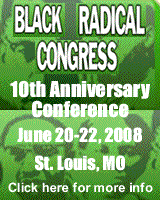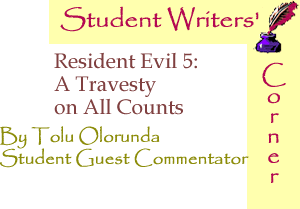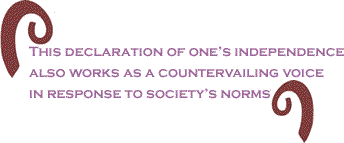
|
||||||||||||||||||||||
 |
||||||||||||||||||||||
 |
||||||||||||||||||||||
 |
||||||||||||||||||||||
 |
||||||||||||||||||||||
 |
||||||||||||||||||||||
 |
||||||||||||||||||||||
 |
| The current issue is always free to everyone |
|
|
 |
A couple weeks ago, a friend sent me a YouTube link. He described it as “African genocide.” Not knowing what to expect, I clicked on it. What I witnessed for those next 3 minutes, was nerve-wrecking, painful, mind-numbing and heart-racing. It was a trailer for a Video Game called “Resident Evil.” This specific trailer was an eyeful in the most
horrid sense. It wasted no time in capitalizing upon the long
history of blatant depictions of Africans as savages and helpless
imbeciles. The trailer featured a Caucasian male mutilating
African villages, along with Africans. With the not-so ancient
history of colonialism and neo-colonialism in The Video Game industry is one which has profited immensely from the casualty of black on black hostility. Notable products of its faculty include, “50 Cent: Bulletproof,” “Def Jam: Icon” and “Grand Theft Auto.” This $10 billion market owes the majority of its inspiration to the tragic decisions of young black and brown teenagers.
A 2005 survey suggests that Blacks constitute 2% of the demographic makeup of Game Developers, with Latinos making 2.5%. How ironic is it, that this reality does very little to punctuate the disproportionate consumption of video game products by Black and Brown teenagers. The early release of the Resident Evil 5 trailer provoked certain journalists to voice their outrage over the transparently racist façade. Newsweek's gaming journalist, N'Gai Croal, was one of a few of those who rose to occasion. In an interview, he eloquently stated, "I looked at the Resident Evil 5 trailer and I was like, 'Wow, clearly no one black worked on this game’… The point isn't that you can't have black zombies. There was a lot of imagery in that trailer that dovetailed with classic racist imagery. What was not funny, but sort of interesting, was that there were so many gamers who could not at all see it.” To say the least, Resident Evil 5 producer, Jun
Takeuchi, appears to be a card-carrying member of that classic
club which pride themselves in being comfortably uninformed
of the racial realities that engulf the societies in which they
exist. He claimed to be bitterly misinformed of the racial conundrum
he had created.
Upon a moment’s reflection, it appears as though
the record producers and video-game producers have co-authored
a “3 step mode” to further the desecration of young Black/Brown
imaginations. The first being the, “Play it in your mind mode
(The Envisioning).” The second as the “Play it with your hand
mode (The Experiment).” And finally, the “Play it with your
heart mode (The Execution).” It also raises the grim question of why there continues to be a shortage of positive Black/Brown role-models, on TV shows and News Channels. Recent studies by Independent media groups reveal a troubling truth concerning the role of the media in distorting the imagery of communities of color. A progressive research and information center, “Media Matters,” did a study highlighting how grossly under-represented Blacks and Browns are in the Major media beltway. The study revealed how on an average, Blacks make up 7% of media guests, and Browns make up 1%. This not-so-startling detail also underlined the hypocrisy of media outlets in a time of racial controversies. The study documented the surge in Black/Brown guests after such unforgettable events as, “The Don Imus incident” and “Michael Richards’ racial tirade.” In moments like this, with an absence of impressive
leadership and progressive follower-ship, it is valuable to
pause for a moment and question ourselves; what would Marcus
Garvey think, say and do? It is crucial that we take his many
words into consideration, especially his warning that, BlackCommentator.com Guest Student Commentator, Tolu Olorunda, is an 18-year-old local activist/writer and a Nigerian immigrant. Click here to reach Tolu Olorunda
|
Any BlackCommentator.com article may be re-printed so long as it is re-printed in its entirety and full credit given to the author and www.BlackCommentator.com. If the re-print is on the Internet we additionally request a link back to the original piece on our Website. Your comments are always welcome. eMail
re-print notice
If you send us an eMail message we may publish all or part of it, unless you tell us it is not for publication. You may also request that we withhold your name. Thank you very much for your readership. |
|
| June
19, 2008 Issue 282 |
|
| Executive Editor: Bill Fletcher, Jr. |
| Managing
Editor: |
| Publisher: Peter Gamble |
| Est. April 5, 2002 |
| Printer Friendly Version in resizeable plain text format or pdf format. |
 |
 |
 |
| |
| |























 Psychologists
Craig A. Anderson, PhD., and Karen E. Dill, PhD, did some studies
on the decipherable effects of harshly-toned video games on
the minds of impressionable teenagers. They concluded that,
“young men who are habitually aggressive may be especially vulnerable
to the aggression-enhancing effects of repeated exposure to
violent games,” and the fact that “Violent video games provide
a forum for learning and practicing aggressive solutions to
conflict situations… In the short run, playing a violent video
game appears to affect aggression by priming aggressive thoughts.
Longer-term effects are likely to be longer lasting as well,
as the player learns and practices new aggression-related scripts
that can become more and more accessible for use when real-life
conflict situations arise."
Psychologists
Craig A. Anderson, PhD., and Karen E. Dill, PhD, did some studies
on the decipherable effects of harshly-toned video games on
the minds of impressionable teenagers. They concluded that,
“young men who are habitually aggressive may be especially vulnerable
to the aggression-enhancing effects of repeated exposure to
violent games,” and the fact that “Violent video games provide
a forum for learning and practicing aggressive solutions to
conflict situations… In the short run, playing a violent video
game appears to affect aggression by priming aggressive thoughts.
Longer-term effects are likely to be longer lasting as well,
as the player learns and practices new aggression-related scripts
that can become more and more accessible for use when real-life
conflict situations arise." Activist
and, Rap group, “Public Enemy” front-man, “Chuck D”, in a song
titled “Can you hear me now” from their latest release, “How
you sell Soul to a Soulless People who sold their Soul,” rapped,
“Damn if I be some slave again/ Got no fake ass friends and
no timbs or rims/ Sure ‘nuff got no designer names/ And I never
played no video games.” This declaration of one’s independence
also works as a countervailing voice in response to society’s
norms. In addition, it hints at a strange relationship between
the Hip-Hop Industry and the Video-Game Industry.
Activist
and, Rap group, “Public Enemy” front-man, “Chuck D”, in a song
titled “Can you hear me now” from their latest release, “How
you sell Soul to a Soulless People who sold their Soul,” rapped,
“Damn if I be some slave again/ Got no fake ass friends and
no timbs or rims/ Sure ‘nuff got no designer names/ And I never
played no video games.” This declaration of one’s independence
also works as a countervailing voice in response to society’s
norms. In addition, it hints at a strange relationship between
the Hip-Hop Industry and the Video-Game Industry.






